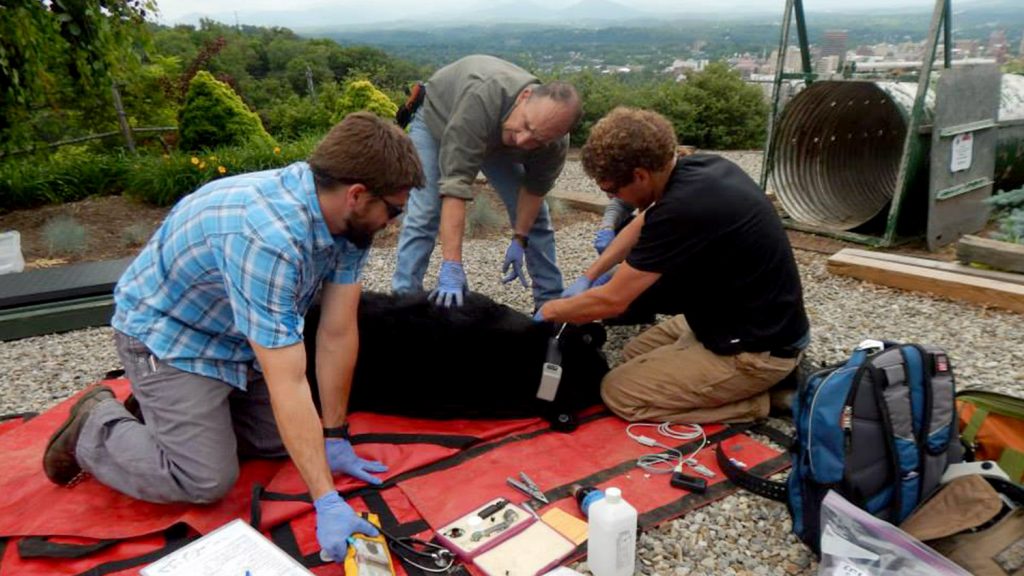Ph.D. in Fisheries, Wildlife, and Conservation Biology

The Ph.D. program in Fisheries, Wildlife, and Conservation Biology allows doctoral students to pursue an advanced degree in a wide variety of subjects involving fisheries and wildlife, including topics that overlap with environmental resources, forestry and other specialty areas supported by the College of Natural Resources, College of Agriculture and Life Sciences, and College of Veterinary Medicine.
Faculty and students in Fisheries, Wildlife and Conservation Biology conduct applied research to help guide sustainable solutions for conservation challenges locally, regionally and globally. For a look at topics graduate students have pursued, please visit the Electronic Thesis and Dissertation Library of the NC State Graduate School.
Requirements
The Ph.D. program requires 36 to 54 credits of course work beyond the master’s degree, including two hours of seminar, FW 730 (Ethics in Fisheries, Wildlife, and Conservation Biology), and a dissertation. Exceptionally well-prepared students may petition to have their degree objective changed to Ph.D. before completing the master’s degree. There are no language or minor requirements.
The two hours of required seminar can be met by taking a combination of seminar classes approved by the student’s committee. We encourage students to take AEC 502, but other good options include FOR 801/803, and PRT 801.
Ph.D. advisory committees must include four faculty members with appointments to the NC State Graduate Faculty. The chair must have an appointment on the Fisheries, Wildlife, and Conservation Biology Faculty and must be a full member of the Graduate Faculty. If co-chairs are designated, at least one of them must be a full member of the Graduate Faculty.
Ph.D. students reside in the department of their major professor.
General Requirements
General requirements are listed below. All referenced Ph.D. forms can be found in downloadable format online.
- Identify an advisory committee to be appointed by the Graduate Dean upon the recommendation of the DGP.
- Select a dissertation subject and submit an outline of proposed research to the advisory committee for review and approval.
- Prepare a Plan of Graduate Work with input from the advisory committee, to be approved by the DGP and submitted to the Graduate School for approval. This must be done as soon as is feasible after completion of 12 hours of course work.
- Pass written examinations in all major and minor fields (if required) no earlier than the end of the second year of graduate study and no later than one semester before the final oral examination. Results are reported to the Graduate School.
- Following satisfactory completion of all required written examinations, submit a Request for Approval to Schedule the Doctoral Oral Examination to the DGP at least two weeks prior to the suggested date. The student and examining committee will be notified once the Graduate School approves the request.
- Be admitted to candidacy after the prelim has been passed without conditions.
- Obtain candidacy within six years of the start of the program.
- Submit a preliminary draft of their dissertation to the chair of the advisory committee for review.
- Give a dissertation to advisory committee members for review at least two weeks prior to the final oral examination.
- Submit a Request for Approval to Schedule the Doctoral Oral Examination, designating the final oral examination, to the DGP at least two weeks prior to its suggested date. This request should be submitted four or more months after admission to candidacy, and after the dissertation is complete (except for revisions triggered as a result of the final exam). Approval of this request must be granted by the Graduate School.
- Upload the dissertation into the ETD system according to the Grad School timeline. Have the dissertation reviewed and approved by the thesis editor of the Graduate School to insure that the format conforms to the specifications prescribed in the Thesis and Dissertation Guide.
- Submit the dissertation in the format and time frame required by the Graduate School.
- Achieve a GPA of at least 3.0 to qualify for graduation.
- Complete all degree requirements within ten calendar years, beginning with the date the student commenced courses carrying graduate credit applicable to the degree program.